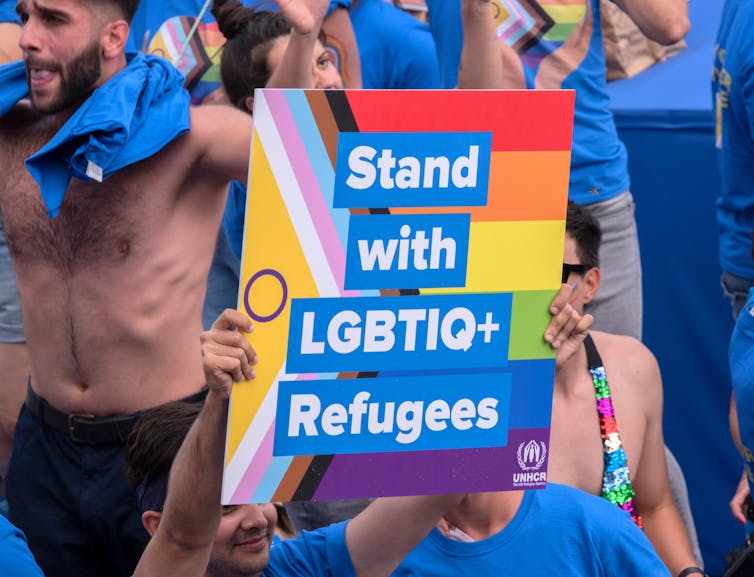How to republish
Read the original article and consult terms of republication.
LGBT+ refugees in France: difficulties accessing international protection

Government repression of LGBT+ people is increasing in several countries around the world, as seen by the recent examples of Ghana, Iraq, and Russia.
Faced with climates of hostility that can take many forms (legal sanctions, discrimination, isolation, social stigma, attacks or even death threats), some people leave their country in the hope of finding greater security elsewhere. Some travel to Europe and seek asylum on the grounds of persecution or fear of persecution based on sexual orientation or gender identity (SOGI) characteristics..
Due to the lack of official statistics on the reasons for seeking protection, it is currently extremely difficult to estimate the number of SOGI asylum seekers, although a report in 2011 proffered an estimate of around 10,000 SOGI asylum applications in the European Union per year.
In France, the activity reports of specialist NGOs provide figures that show the increase in the number of such claims. For example, in 2010 ARDHIS assisted 79 new SOGI asylum seekers, a figure that rose to 821 in 2018. However, this data is difficult to use because it does not allow us to obtain an overall estimation. It only provides information on the number of people assisted by a single NGO and does not include those supported by other NGOs or, especially, those who submit an asylum application without any form of support from an organisation.
In addition, these figures depend on the structure of the charity itself and the level of support it can offer, which necessarily limits the number of people it can assist. Nevertheless, even if this data gives an underestimated view of reality, it does clearly show the increase in these claims over the past few years.
However, while granting refugee status in European countries to persecuted minorities on the grounds of their sexual orientation or gender identity may strengthen the « sexual order of the world », rhetoric, migration to a Western country is not intrinsically synonymous with “liberation” for LGBT+ exiles.
The ethnographic survey I carried out among asylum seekers based on sexual orientation or gender identity in the Paris region between February 2017 and February 2020, as part of a PhD research project, shows the difficulties faced by those claiming refugee status in addition to new and multiple forms of marginalisation in the country of arrival.
“I knew about political asylum, but not asylum for gays”
Applying for SOGI asylum is not a straightforward process. For those who arrive in Europe, the first major obstacle is finding safety and succeeding arriving in Europe, in a global context of tightened borders and migration policy. Secondly, turning to SOGI asylum procedure is by no means an obvious choice.
Firstly, because some people do not know that they can seek asylum on the grounds of persecution linked to SOGI. They automatically associate asylum seeking with fleeing conflict or political repression.
This means that, while such grounds for seeking asylum are now well defined and structured by institutions, access to information can be a discriminating factor in obtaining refugee status. People engaged in militant activities in their countries, those with significant cultural capital or people who are part of transnational networks that facilitate the circulation of information are more likely to be aware of the possibilities for seeking asylum as a persecuted LGBT+ person when they arrive in France, sometimes even before their departure. Others, meanwhile, are unaware of this possibility.
In addition, even with this information available, multiple fears remain. For those who have no choice but to arrive in France illegally - having no legal way of leaving their country or having to do so in a hurry - taking administrative steps with the French authorities can be a daunting prospect.
Similarly, because of past experiences of LGBT+ phobia and the fact that France is not always seen as a place of protection and freedom for sexual and gender minorities (some people are unaware of legislation recognising the rights of LGBT+ people in the country, for example), the idea of having to tell a public authority that you are gay, bisexual or trans-identified can be inhibiting. Adama [1], a refugee from Côte d'Ivoire, talks about his initial reluctance to seek asylum:
“I hesitated. I hesitated a lot because I was a bit reluctant, I was scared because I didn't know the system, I didn't know whether, if I mentioned it, perhaps explaining it to the prefecture, the person would send me away. Because I'm gay, because we get rejected a lot. But, thanks to the advice of Fabrice [an ARDHIS volunteer], my fears were assuaged, and I went.”
However, all these factors that delay the application for asylum also affect the process itself as well as the daily lives of asylum seekers. If an asylum application is lodged more than 90 days after the person’s arrival in France - a period reduced by the 2018 Asylum and Immigration Act, the application will be fast-tracked through an accelerated procedure by the prefecture, which means, among other things, that it will be processed more quickly and the applicant may be refused initial material support such as the Allocation pour Demandeur d'Asile (Asylum Seeker Allowance) and accommodation provided by the French Office for Immigration and Integration.
“I’m a lesbian, Madam’. Imagine if she doesn’t believe me!” The frontier of credibility
Once the asylum claim has been lodged, the person still has to be recognised as a refugee by the French Office for the Protection of Refugees and Stateless Persons (OFPRA) or the National Court of Asylum (CNDA) in the event of an appeal following an initial refusal by OFPRA.
During the interviews with the different institutions, asylum seekers must convince their audience of the merits of their claim and the “veracity” of what they’re saying in a context of general suspicion towards them.
In the case of SOGI asylum seekers, it is not just the credibility of their claims about the risk of persecution if they return that is in question, but also the credibility of their claims about their sexual orientation or gender identity.
While practices for assessing SOGI asylum requests have been formalised over the past few years to prevent certain abuses in the way SOGI is “assessed”, these changed also put into effect the fact of requiring assessors to pass judgement on the credibility of the applicants’ SOGI claim.
Applicants are not only questioned about the persecution suffered but also their discovery of their minority SOGI characteristics, their romantic relationships and the precautions they take to conceal their SOGI on a day-to-day basis; and must provide a story of their life that meets certain standards of credibility as an LGBT+ person.
This requires, first of all, a particular way of expressing oneself that is common to all asylum applications, i.e. a coherent, embodied, chronologically structured narrative that is sufficiently detailed to attest to its "authenticity". It is a way of expressing oneself that is not necessarily self-evident, especially when dealing with subjects as intimate as SOGI, as Amir, from Morocco, explains.
“It was sometimes difficult for me, you know. There are some things that I don't even know how to say in Arabic. […] So, the question about the first time I felt I was gay. Well, ever since I was born, I’ve never had a relationship with a girl, I’ve only had relationships with guys. I don’t know, I’ve felt like that since I was a child, aged 14 or 15. […] The question is, how to prove I’m gay. How? You want me to bring in a man and make love to him in front of you? I tried to explain all I could about my homosexuality, I tried to tell her everything I could remember from childhood and the relationships I’ve had with guys. But she wasn’t convinced.”
Added to this are certain representations of the institutions against which the “credibility” of the applicants' SOGI is judged. In 2020, a study supported by the French Defender of Rights highlighted the persistence of stereotypes and Eurocentric views of homosexuality in the assessment of asylum requests.
In addition, the unfair appreciation of LGBT+ refugees and the essentialist view of their country of origin lead to an imperfect reading of the reality that limits the scope of credibility. The tendency to expect certain life stories marked by suffering or trouble upon discovering a “sense of being different” leaves little room for variants.
Similarly, the recurrence of the theme of “precautions” and “risk taking” shows the fragile balance in which the applicants’ credibility hangs: on the one hand, they are required to provide evidence of sufficient personal experiences that attest to the veracity of their SOGI characteristics, while on the other hand, they must substantiate the conditions under which they can express their SOGI characteristics, in an environment considered uniformly hostile and where it seems unlikely that they will be able to do so.
Paradoxically, in most cases, the discourse must be prepared and personal experiences clearly identified in advance in order to produce a story that appears authentic and credible.
Such normative expectations increase inequalities between asylum seekers, who do not all have access to support from NGOs offering help with such preparation, or to resources and skills enabling them to master this kind of self-presentation.
While the rejection of an asylum seeker’s claim has direct administrative and material implications, namely that they have no right to remain in France, it also has psychological consequences: the refusal of international protection and, with it, the permission to stay in the country, can create the sensation of reliving past denigration experienced as an LGBT+ person.
All first names in this article have been changed.
Identity card of the article
| Original title: | Réfugiés LGBT+ en France : un difficile accès à la protection internationale |
| Author: | Florent Chossière |
| Publisher: | The Conversation France |
| Collection: | The Conversation France |
| License: | This article is republished from The Conversation France under a Creative Commons license. Read the original article. An English version was created by Hancock & Hutton for Université Gustave Eiffel and was published by Reflexscience under the same license. |
| Date: | July 3, 2024 |
| Langages: | French and english |
| Keywords: | Homosexuality, refugees, gender, society, asylum rights, France, transgender, LGBTQ |

![[Translate to English:] Licence creative commons BY-SA 4.0 [Translate to English:] Licence creative commons BY-SA 4.0](https://reflexscience.univ-gustave-eiffel.fr/fileadmin/ReflexScience/Accueil/Logos/CCbySA.png)